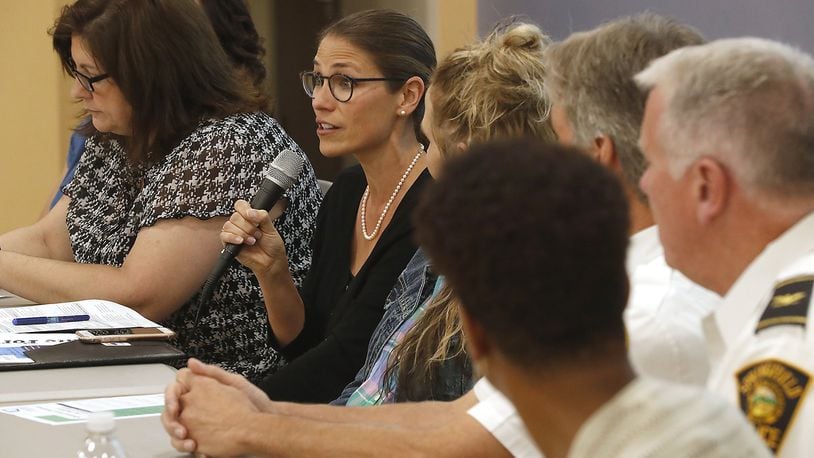About 50 people attended a community forum about the local opioid epidemic held by the Clark County Substance Abuse Prevention, Treatment and Support Coalition at the United Senior Services Center.
Multiple speakers spoke about the epidemic, including Springfield Fire/Rescue Division Chief Nick Heimlich; Springfield Police Division Chief Steve Moody; Dr. Greta Mayer of the Mental Health and Recovery Board of Clark, Greene and Madison Counties; Denise Estep of Clark County Department of Job and Family Services; Wendy Doolittle of McKinley Hall; and Melanie Silvus of the Families of Addicts support group.
A majority of the 89 suspected drug deaths in Clark County were caused by fentanyl, a synthetic drug that’s 50 to 100 times more powerful than heroin, said Doolittle, the chief executive officer of the local treatment facility. About half of those deaths came from people who had never sought treatment, she said, which means more people are being introduced to these powerful drugs.
“It tells us there’s a lot of work to do on the prevention end,” she said.
In order to end the stigma of addiction, residents must understand how the brain works, she said. Addiction is a chronic brain disease, Doolittle said. She constantly hears that people choose to use drugs and that they should have greater willpower to stop, she said.
MORE: Drug epidemic wreaking havoc on Clark County businesses, economy
“If you are educated about the brain, you don’t hear those kinds of comments,” Doolittle said.
It takes about a year for the brain to heal enough for people to have the willpower to refuse drugs, Doolittle said, but there’s still the chance of relapse, she said.
No two stories are the same when it comes to the path to drug use or recovery, Doolittle said.
“These people are survivors,” she said. “The kind of traumas they’ve had and that we as a society failed to connect with in their youth. We’re missing the mark. The question for me is never ‘what’s wrong with you?’; it’s what happened to you?’ We know that something else is going on with the brain.”
The relapse rates for hypertension and asthma are 50 to 70 percent, Doolittle said — that’s higher than addiction at 40 to 60 percent.
RELATED: Demand for, debate over Narcan soars in Springfield
“People don’t want to talk about it,” Doolittle said.
The drug epidemic will have created about 800 to 1,000 additional runs for the fire division, Heimlich said.
As of Monday, the police division has responded to 690 mental health calls, which includes overdoses, this year — nearly double the 350 it responded to in 2016, Moody said.
DETAILS: S pringfield churches unite to open recovery house for addicts
He asked the community to help the police division take drugs off the streets, he said.
“We have to step up, shoulder-to-shoulder, with the families of those who are addicted and take on those traffickers and that takes courage,” Moody said.
While the community is working to provide more beds at treatment centers for detox, other organizations will help addicts find treatment in other areas of Ohio, Doolittle said. Families of Addicts will also help individuals find treatment centers both in Ohio and other states, if necessary.
“Where ever we can get a bed open, if we can get you detox and that’s part of the discharge plan, we’ll get you there,” she said.
Similar forums were held earlier this year for both local government leaders and business owners. Three more forums will be held for schools, the family community and medical personnel, she said.
3 QUICK NEWS-SUN READS
Clark County schools make changes due to drug crisis, 1 stocks Narcan
Clark County leaders glad to hear Trump call drug crisis an emergency
Drug crisis traumatizing children in Clark County, state
BY THE NUMBERS
89: Suspected drug deaths in Clark County in 2017.
77: Confirmed drug deaths in Clark County in 2017.
24: Infants who were born who were addicted to opiates in Clark County last year.
ABOUT THIS SERIES
The Springfield News-Sun has written extensively about opioid and heroin problems in Clark County in the past five years, including stories about multiple overdoses in one weekend and efforts to expand treatment options. This year, the News-Sun will take a deep dive into the community’s drug epidemic and what local leaders are doing to solve the problem.
About the Author
